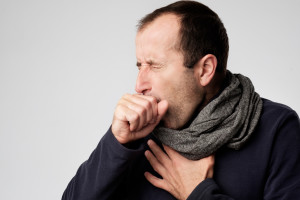 Pneumonia is a common lung infection where the airspaces in one or both lungs are inflamed. This inflammation may cause the air sacs to become filled with fluid which makes it difficult to breathe. Pneumonia is caused by either bacteria, a virus or a fungal organism. The typical symptoms of pneumonia are cough, chest pain, trouble breathing and fever. More than 3 million Americans contract pneumonia each year. Pneumonia can be lethal, especially for infants, children and adults over the age of 65. Around 50,000 of people die from pneumonia each year in the United States. It is important to recognize the signs and symptoms of pneumonia in order to get treatment early.
Pneumonia is a common lung infection where the airspaces in one or both lungs are inflamed. This inflammation may cause the air sacs to become filled with fluid which makes it difficult to breathe. Pneumonia is caused by either bacteria, a virus or a fungal organism. The typical symptoms of pneumonia are cough, chest pain, trouble breathing and fever. More than 3 million Americans contract pneumonia each year. Pneumonia can be lethal, especially for infants, children and adults over the age of 65. Around 50,000 of people die from pneumonia each year in the United States. It is important to recognize the signs and symptoms of pneumonia in order to get treatment early.
Signs of pneumonia
In addition to flu-like symptoms, a person might experience the following symptoms if they have pneumonia:
• Coughing up greenish, yellow or bloody phlegm
• Nausea and vomiting
• Wheezing
• High fever up to 105 F
• Being unable to catch one’s breath
• Muscle aches
• Diarrhea
• Chest pain when coughing or taking a deep breath
• Chills or excessive sweating
• Low appetite
• Accelerated or shallow breathing
• Fast heart rate
• Extreme tiredness
• Confusion in older people
• Lips or fingernails turning blue
Risk Factors for pneumonia
• Smoking
• Being over the age of 65
• Human immunodeficiency virus (HIV)
• Acquired immunodeficiency syndrome (AIDS)
• Recent viral respiratory infection or cold
• Emphysema
• Chronic lung diseases such as asthma, COPD or cystic fibrosis
• Heart disease
• Difficulty swallowing
• Diabetes
• Recent surgery or trauma
• Autoimmune disorders
• Weakened immune system
• Cerebral palsy
• Living in a nursing home
• Working in construction or agriculture
How to help prevent pneumonia
• Not smoking
• Get flu vaccine each year
• Wash hands frequently, especially after using the restroom and before eating
• Eat a healthy diet with lots of fruits and vegetables
• Exercise regularly
• Drink lots of water
• Get enough sleep each night
• Avoid sick people
• Get pneumococcal vaccine if necessary
Vaccines for pneumonia
There is not currently a vaccine for all types of pneumonia, but there are 2 types of vaccines that are available today. The first one, pneumococcal conjugate vaccine (PCV) is recommended for all children under 5 years old. The second, pneumococcal polysaccharide vaccine (PPSV) is recommended for children 2 years of age and adults over 65 or those who exhibit many of the risk factors for pneumonia.
Treatment of pneumonia
Treatment of pneumonia depends on its cause. Doctors will usually order a chest x-ray to see if there is pneumonia and determine how widespread it is. They will also run a blood test to tell what exactly caused the pneumonia.
• Antiviral medications can treat some types of pneumonia that are caused by certain viruses.
• Antibiotics are used to treat pneumonia caused by bacteria. Getting started on them early can reduce the length and severity of the pneumonia.
Other things that should be done to help manage pneumonia
• Drink plenty of fluids
• Get a lot of rest
• Do not try to stop coughing unless it is bad enough to cause vomiting or it makes breathing difficult, coughing up the mucus helps get rid of the infection
• Stop smoking if you smoke
• Stay home from work or school until the symptoms go away
• Using a humidifier or taking a warm bath can help clear lungs
• Take acetaminophen to treat fever
Where to go for severe pneumonia
If you are suffering from a severe case of pneumonia you should seek treatment at a hospital right away. OakBend’s Emergency Rooms are specially equipped to treat very serious cases of pneumonia in both children and adults. They are open 24 hours a day, and have three convenient locations throughout the greater Houston area. If you are experiencing the symptoms of pneumonia and have a persistent fever, especially if it is 102-degree F or higher you should seek treatment immediately. For more information or to schedule a tour the facilities at OakBend Medical Center please call 281-341-3000 today.
